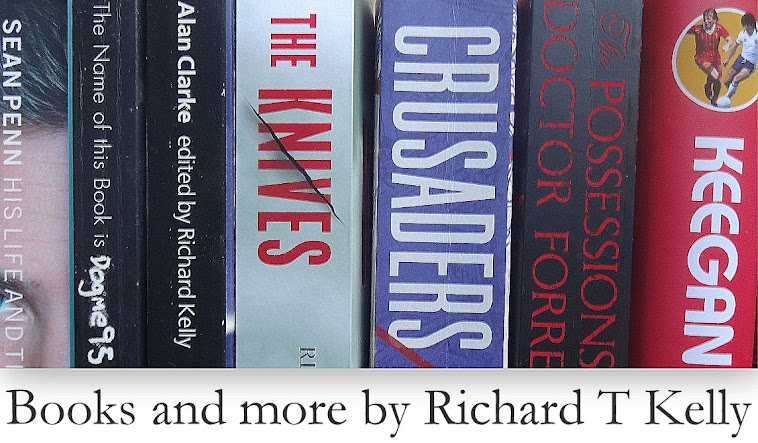 A celebrated film director of my acquaintance keeps a framed photograph of Brecht (not unlike the one to your left) on the wall of the rustic kitchen in his English country cottage. On first noticing said portrait during a visit, I remarked to said director that I hadn’t ever suspected he was such a Brecht fan. ‘Oh I don’t know that I am’, came the reply. ‘I just like to have him around. How could you not?’
A celebrated film director of my acquaintance keeps a framed photograph of Brecht (not unlike the one to your left) on the wall of the rustic kitchen in his English country cottage. On first noticing said portrait during a visit, I remarked to said director that I hadn’t ever suspected he was such a Brecht fan. ‘Oh I don’t know that I am’, came the reply. ‘I just like to have him around. How could you not?’Here’s a quick rundown of my own limited but much savoured form in the study and appreciation of BB:
- In 1985 I saw a production of Brecht and Weill’s Happy End mounted by the RSC and presented on tour in the sports hall of a fairly grim ‘leisure centre’ on the outskirts of Belfast. I hadn’t previously seen such a joyous piece of live theatre in all my life; and that evening would still rank right up there in the annals for me.
- By my desk as I write is a humble cassette recording of the cast of The Threepenny Opera from a 1954 staging of Marc Blitzstein’s book and lyrics. I bought that tape in 1988 and it’s travelled everywhere with me in the 20 intervening years. Threepenny is by some distance – i.e. miles and miles – my 'favourite musical'.
- In 1998-99 I was so fortunate as to spend a bit of time in the company of the late John Willett, consummate collaborator, English translator and critical interpreter of Brecht – the sort of laconically brilliant, easily witty man who’d make you proud to be English. My copy of his Brecht in Context is inscribed with John’s small, precise hand, and its introduction, wherein he charts the history of his passion for Brecht, offers repeated proofs of the sangfroid I’m talking about:
‘I had left school early to go to Vienna and spend six months studying the cello… Almost incidentally I became fluent in the [German] language… In the autumn of 1936 I moved on to Oxford to learn politics, philosophy and economics [Love that ‘learn’]… The war came, as we knew it would, and for five and a half khaki-clad years all I was left with was my addiction [to Brecht’s work]… There was in fact only one point of sharp conflict between Brecht and I, when I said I thought war between Communist states was by no means inconceivable. That, he snapped, was ‘eines Gymnasiasten Ansicht’, a schoolboy’s view…’
Superb, eh? Passing through the garden gate of John’s Hampstead cottage and stepping into his book-lined sitting room was for me an experience full of magic that I’ll not forget.
- From the late 1990s through to the mid-2000s I was a not infrequent visitor to Los Angeles for work purposes. And just as most literary-minded visitors to Prague find it impossible to keep Franz Kafka from their minds for long, I would defy any booklover to pass more than a few days in LA without making recourse to Brecht’s diamond-sharp poetry about the city – a place full of ‘houses built for happy people, therefore standing empty / even when lived in.’
- But Brecht’s poetry wasn’t all scathing, which is why my wife and I picked the Sonnet #19 (‘My one requirement: that you stay with me’) as a reading at our wedding ceremony in 2004.
- My all-time favourite Brecht quote, at least with regard to theatre composition and technique, comes in his famous discussion of Coriolanus where he argues that his mission as a dramatist is both to have the pleasure and to convey the pleasure of dealing with what he calls ‘illuminated history’: the dialectic experienced as drama – and not in any rarefied, high-flown way but, rather, where the play has a direct audience appeal and could be enjoyed even in passing at a country fair… because it’s a good old familiar story of the rise and fall of the mighty, the cunning of the oppressed, the hidden potentials of men.
- Brecht's celebrated stage plays haven't always worked the same charm on me as his poems, his musicals, even his handful of movie scripts (chief among them Kuhle Wampe). I enjoy the plays endlessly on the page, less so in performance. Today, though, I dropped into the Olivier auditorium of the National Theatre to see a matinee of Deborah Warner’s staging of Tony Kushner’s adaptation of Mother Courage and Her Children. Such are the perks of my current writing attachment at the National Theatre Studio, and I had a fabulous time. This is a rambunctious, wrenching, endlessly lively piece of theatre. The stagecraft might be of a higher order than Brecht would have thought necessary, but the audience are the happy beneficiaries of all this merry, mauling invention. In the lead role Fiona Shaw is a phenomenon, as usual. I’m not such an ardent fan of hers as are other theatregoers of my acquaintance, but days like today make me feel slovenly in that estimation. Warner’s production derives a big boon from the new arrangement of Brecht’s songs by the Northern Irish singer/musician Duke Special, who also performs in the piece with his band, his contributions deeply treasurable throughout. I noticed Deborah Warner herself at the back of the house, showing a commendable level of immersion in her project to be observing its condition on a Wednesday matinee a month into the run. I don't doubt she's finical about this stuff, but I trust she wasn't too worried...

No comments:
Post a Comment